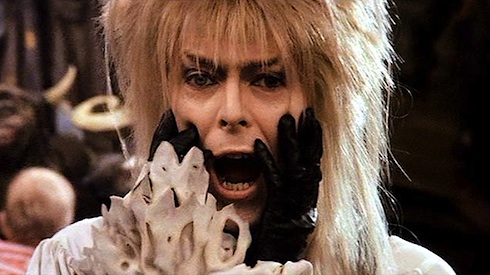Labyrinth was Jim Henson’s second collaboration with artist Brian Froud, following The Dark Crystal four years earlier. Labyrinth was clearly a very different, more expansive type of project; Henson and Froud were joined by George Lucas as executive producer, Monty Python’s Terry Jones wrote the screenplay, and rock demigod David Bowie signed on to star, as well as write and perform the movie’s soundtrack.
Whereas The Dark Crystal is often seen as Henson and Froud’s freewheeling homage to fantasy àla Tolkien, Labyrinth is much more structured and far more aware of its influences; it’s also wonderfully allusive and meta at points, filled with references to the Brothers Grimm, Hans Christian Andersen, L. Frank Baum, Lewis Carroll, Maurice Sendak, and Walt Disney. And yet the movie doesn’t limit itself to clever references — it’s very clearly participating in the classic tradition of works like The Wizard of Oz, the Alice books, and Where the Wild Things Are, in which a young protagonist escapes a humdrum existence into an exotic, sometimes threatening, alternative reality.
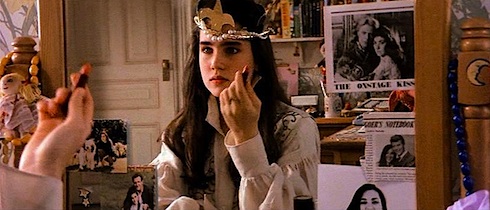
The film opens with our teenaged protagonist, Sarah, lost in her own little world, preferring to hang out in costume reciting plays in the park than she is in “normal” teenaged stuff like dating. The first ten minutes of the movie do a stellar job of setting up Sarah as the heroine of her own suburban fairy tale, the put-upon Cinderella who stomps her way huffily through interactions with her more-exasperated-than-evil stepmother and nice-but-clueless dad. It’s a tribute to Jennifer Connelly’s performance that Sarah manages to exhibit all the hyper-dramatic martyrdom of your average 16-year-old while still seeming sympathetic and likeable — it’s easy to identify with her in the same way that we identify with Alice, or Dorothy Gale, or Sendak’s Max.
Perhaps on some level, the petty tyrannies of bossy adults, no matter how well-meaning, are always going to strike a chord with anyone who’s ever been a kid. In spite of Sarah’s mini-tantrum over having to babysit her baby brother (played by young Toby Froud, whose parents met while working on The Dark Crystal), it’s hard to blame her for feeling unappreciated and angry at not having any say in the matter…except that she is, unexpectedly, given her say. By none other than Mr. David Bowie.
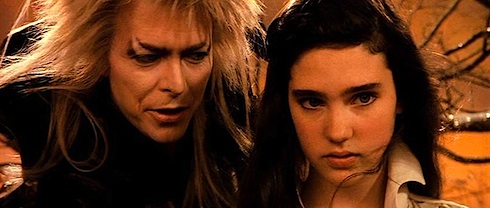
Well, technically, Sarah’s wish is granted by Jareth the Goblin King, who happily complies with her request to spirit the screaming Toby away to his castle, to her immediate regret. She demands that Jareth return the baby, and when she refuses to accept his gifts or be swayed by his arguments, he leaves her at the titular labyrinth, telling her that she has thirteen hours to solve it and rescue her brother, or Toby will remain with the goblins forever. Confidently, even cockily, Sarah sets off on her quest, but soon finds that her expectations thwarted at every turn.
She is consistently frustrated by the bizarre, whimsical, through-the-looking-glass logic of the labyrinth and its inhabitants, fails to ask the right questions, acts on her assumptions rather than facts. She learns the hard way that faeries bite, and that a good many other things in the labyrinth are not what they seem to be. As a friendly worm tells her early on, “You can’t take anything for granted,” and Sarah soon internalizes that advice, learning to think for herself, accepting that she won’t always get her way, facing up to the fact that reality isn’t going to bend itself to her whims. The labyrinth is nothing but a continuous series of choices, but as Sarah finds herself in control of her destiny, she soon realizes that choices can be a tricky, and all decisions have inescapable consequences.
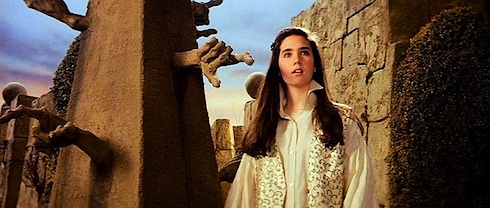
She also begins to make friends along the way, but even that isn’t easy. Sarah’s first companion on the journey is a dwarf named Hoggle, and their relationship is forged through a complicated process of distrust, bonding, betrayal, guilt, and redemption: Girl meets Goblin-like creature, Girl is disgusted by Goblin-like creature and his craven, fairy-killing ways, Goblin helps Girl after girl bribes Goblin, Goblin abandons Girl, then saves her, then double crosses her by means of a spiked peach, finally learns to be heroic and is forgiven. Like everything else in this film, friendship and trust is anything but simple; it’s a learning process, with ups and downs, and entails risk as well as reward.
Meanwhile, as Sarah makes her way through the labyrinth (as well as the series of epiphanies and life lessons lurking around every corner), Jareth watches her progress with increasing displeasure, pouting on his throne while sporting a riding whip and high-heeled boots, as goblin kings are wont to do, and occasionally performing a baby-juggling musical number. As much as I’m tempted to make fun of Bowie’s over-the-top performance (and costumes. And wig and makeup), I actually think he was a brilliant choice for the role. If we think about Labyrinth as a commentary on the role of fantasy in the modern world, a kind of updated fairy tale for the late 20th century, who better to embody the lure of the fantastic than a rock star, especially as one as otherworldly as Ziggy Stardust himself?
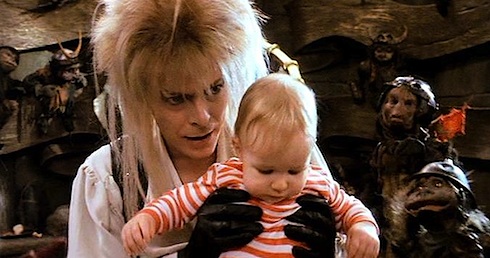
Characters like the Goblin King, or my own personal favorite fairy tale villain, the Snow Queen, tend to represent an unsettling mix of childhood fantasies and adult fears and desires; they draw their would-be victims in through a disturbing blend of infantilization and seduction. Throughout the movie, Jareth attempts to distract Sarah with baubles and gifts, and when that fails, he simply tries ordering her around: “Sarah, go back to your room. Play with your toys and your costumes. Forget about the baby.” Unable to deter her, he has Hoggle slip her the aforementioned poisoned peach, spiked with some sort of potent magical Goblin-roofie.
The resulting hallucination finds Sarah in the midst of what my friends and I always refer to as “Goblin Prom”: dressed in a very grown up, gorgeous ball gown and gloriously big hair, Sarah makes her way through a claustrophobic masquerade ball filled with vaguely threatening masked dancers and Bowie/Jareth, in his best formal glam Goblin King finery. As the soundtrack swells, the sexual undertones of the masquerade are unmistakable — Sarah is clearly the innocent, suffering the smirks and laughter of the debauched, almost predatory revelers swirling around her. She’s the only one not wearing a mask, since even Jareth hides behind several disguises as he quasi-stalks her through the crowd.
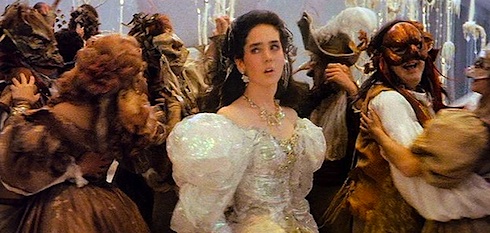
Finally, he reaches her; they begin to dance and as he sings to her, we realize that this is, undeniably, a seduction scene…and something is very wrong. Fighting her way back to reality, Sarah realizes that her time (and Toby’s) is running out, and, in what is simultaneously the worst special effect and the most punk rock moment in the entire film, smashes her way out of Bowie’s smarmy, sexy, smirky distraction-bubble. It’s an amazing sequence — beautiful and unsettling and creepy, and her rejection of Jareth in the scene is powerful precisely because of the uncomfortable juxtaposition of Connelly’s youth and innocence and the much-older Bowie’s rock star magnetism and sinister allure.
The film tends to oscillate between these strategic attempts to distract Sarah by appealing to more selfish, childish desires on one hand and more adult, exotic freedoms on the other. This makes sense the more we realize that the Goblin King is entirely Sarah’s own creation — her belief in him brings him to life, gives him his power, and he needs her imagination and innocence to survive, but she is not prepared to have her whole identity squeezed into an obedient, docile package as a naïve little girl, and not as the prospective Mrs. J. Goblin King, either.
In their final showdown, Jareth offers to fulfill all of Sarah’s dreams, for a price, telling her, “I ask for so little. Just let me rule you, and you can have everything you want.” It’s clear at this point that Sarah must make a choice between the occasionally unpleasant uncertainties and unfairness of life in the real world, or surrender herself to her fantasies by giving up her free will, agency and power, and she barely hesitates before answering, “You have no power over me.” BOOM. Game over, Major Tom.
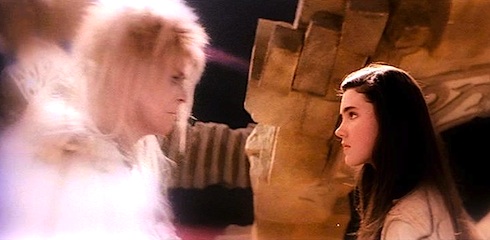
With that one line, balance is restored. Sarah and Toby find themselves safely back at home, and while Sarah is relieved to be back, the movie takes the extra step of assuring her (and the audience), that the world of the labyrinth will always there if she needs it. This has always been one of my favorite aspects of Labyrinth — as much as I see it as a continuing the great coming-of-age-through-fantasy tradition of classic children’s literature, the last scene reassures us that fantasy isn’t necessary meant to be shut out or ignored, any more than reality is. There’s no black and white here: in real life as in the labyrinth, it’s impossible to be a slave to logic. Reality has room for the irrational and the fantastic — life should be a healthy mix of both, and clinging to either extreme is problematic — rejecting reality, or completely rejecting fantasy and imagination are equally unacceptable, by the movie’s reasoning.
I’ve always thought of Labyrinth as the anti-NeverEnding Story — where the power of imagination eventually trumps all in the latter, Labyrinth is all about the balance between the real world and imagination, and about finding joy in both. It’s a sentiment that runs throughout all of Jim Henson’s career, but I’ve always seen it most clearly, here, in his tribute to all the great works of imagination that inspired him along the way.
There are so many amazing things I haven’t had a chance to mention in this film — the truly wonderful script, replete with delightful, Pythonesque touches, the fabulous characters (Ludo! Sir Didymus!), the gorgeous design and puppeteering—but I’m aware that some people love this movie, and others think it’s ridiculous, and there are people in both camps that completely dismiss it as anything but pure camp. And I just have to say that I could not disagree more — I adored Labyrinth as a little kid, and even more as a teenager, then throughout college and I still love it now as an adult, for many, many reasons. But the reason I love it most is that it features a headstrong young female protagonist taking on the world in jeans and sensible shoes.
If that doesn’t sound like much to you, then take into account the fact that the movie revolves around Sarah’s refusal to be treated as a princess (a word never once used in the script). One of the things that this movie does brilliantly is systematically reject the usual “princess” trope — Sarah’s happy ending isn’t going to be found on the arm of some fantasy heartthrob; her adventures in the labyrinth force her to abandon any such princess-y delusions. Her identity is her own, and she isn’t about to be swayed by any bedazzled, leather-loving, tight-panted gigolo with a castle, even if he is some sort of king.
It’s an incredibly subversive approach to the usual fantasy heroine that seems to go unnoticed in the midst of all the muppetry and cleverness and stunning visuals, but to a kid raised on Disney and mediocre sitcoms, it was simply revolutionary, camp or no. In the end, Sarah was allowed to be exactly who she wanted to be — not a child, not an adult, but very much her own person all the same. Labyrinth is a movie about learning to think differently, learning to think for oneself, regardless of people’s expectations, and even more impressively, it’s also a film that practices what it preaches. For that reason, I think that even Alice and Dorothy and Max would agree that this film is, and always will be, a classic.

Bridget McGovern is already writing another post about this movie for Bowie Week…coming sooner than you’d think. Also, she would like to apologize to her three younger siblings for repeatedly trying to get the goblins to come and take them all away. Especially since it never worked.










